
The cultural influence of Gulliver's Travels has spanned centuries.

The cultural influence of Gulliver's Travels has spanned centuries.
From 1738 to 1746, Edward Cave published in occasional issues of The Gentleman's Magazine semi-fictionalized accounts of contemporary debates in the two Houses of Parliament under the title of Debates in the Senate of Lilliput. The names of the speakers in the debates, other individuals mentioned, politicians and monarchs present and past, and most other countries and cities of Europe ("Degulia") and America ("Columbia") were thinly disguised under a variety of Swiftian pseudonyms. The disguised names, and the pretence that the accounts were really translations of speeches by Lilliputian politicians, were a reaction to an Act of Parliament forbidding the publication of accounts of its debates. Cave employed several writers on this series: William Guthrie (June 1738 – November 1740), Samuel Johnson (November 1740 – February 1743), and John Hawkesworth (February 1743 – December 1746).
The astronomers of Laputa have discovered "two lesser stars, or satellites, which revolve about Mars". [1] This may have influenced Voltaire, whose 1750 story Micromégas also refers to two moons of Mars. In 1877, Asaph Hall discovered the two real moons of Mars, Deimos and Phobos; in 1973 craters on Deimos were named Swift and Voltaire, [2] and from 2006 numerous features on Phobos were named after elements from Gulliver's Travels, including Laputa Regio, Lagado Planitia, and several craters. [3]
The term Lilliputian has entered many languages as an adjective meaning "small and delicate". There is even a brand of small cigar called Lilliput. There is a series of collectable model houses known as "Lilliput Lane". The smallest light bulb fitting (5 mm diameter) in the Edison screw series is called the "Lilliput Edison screw". In Dutch and Czech, the words Lilliputter and liliput(án), respectively, are used for adults shorter than 1.30 meters. Conversely, Brobdingnagian appears in the Oxford English Dictionary as a synonym for very large or gigantic.
In like vein, the term yahoo is often encountered as a synonym for ruffian or thug. In the Oxford English Dictionary it is considered a definition for "a rude, noisy, or violent person" and its origins attributed to Swift's Gulliver's Travels. [4]
In the discipline of computer architecture, the terms big-endian and little-endian are used to describe two possible ways of laying out bytes in memory. The terms derive from one of the satirical conflicts in the book, in which two religious sects of Lilliputians are divided between those who crack open their soft-boiled eggs from the little end, the "Little-endians", and those who use the big end, the "Big-endians".
Fyodor Dostoevsky references Gulliver's Travels in his novel Demons (1872): 'In an English satire of the last century, Gulliver, returning from the land of the Lilliputians where the people were only three or four inches high, had grown so accustomed to consider himself a giant among them, that as he walked along the Streets of London he could not help crying out to carriages and passers-by to be careful and get out of his way for fear he should crush them, imagining that they were little and he was still a giant ...'
It has been pointed out that the long and vicious war which started after a disagreement about which was the best end to break an egg is an example of the narcissism of small differences, a term Sigmund Freud coined in the early 1900s. [5]
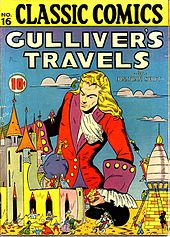
Brian Gulliver's Travels is a satirical comedy series and also a novel created and written by Bill Dare, first broadcast on 21 February 2011 on BBC Radio 4. A second series first broadcast on 25 June 2012 on BBC Radio 4 Extra. The series is a modern pastiche of the Jonathan Swift novel Gulliver's Travels.
Gulliver's Travels has been adapted several times for film, television and radio. Most film versions avoid the satire completely, and primary aim them at children.

Yahoos are legendary human beings in the 1726 satirical novel Gulliver's Travels written by Jonathan Swift. Their behaviour and character representation is meant to comment on the state of Europe from Swift's point of view. The word "yahoo" was coined by Jonathan Swift in the fourth section of Gulliver's Travels and has since entered the English language more broadly.

Gulliver's Travels, or Travels into Several Remote Nations of the World. In Four Parts. By Lemuel Gulliver, First a Surgeon, and then a Captain of Several Ships is a 1726 prose satire by the Anglo-Irish writer and clergyman Jonathan Swift, satirising both human nature and the "travellers' tales" literary subgenre. It is Swift's best-known full-length work and a classic of English literature. The English dramatist John Gay remarked, "It is universally read, from the cabinet council to the nursery." The book has been adapted into films, movies and theatrical performances over the centuries.
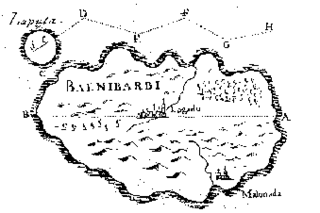
Laputa is a flying island described in the 1726 book Gulliver's Travels by Jonathan Swift. It is about 4½ Miles in diameter, with an adamantine base, which its inhabitants can manoeuvre in any direction using magnetic levitation. The island is the home of the king of Balnibarbi and his court, and is used by the king to enforce his rule over the lands below.
The year 1902 in film involved some significant events.
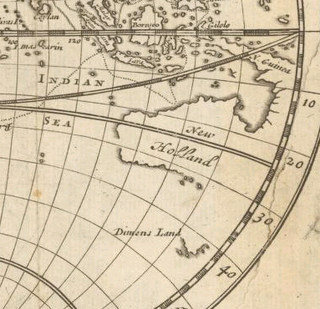
Lilliput and Blefuscu are two fictional island nations that appear in the first part of the 1726 novel Gulliver's Travels by Jonathan Swift. The two islands are neighbours in the South Indian Ocean, separated by a channel 800 yards (730 m) wide. Both are inhabited by tiny people who are about one-twelfth the height of ordinary human beings. Both nations are empires and the capital of Lilliput is Mildendo.

Brobdingnag is a fictional land, which is occupied by giants, in Jonathan Swift's 1726 satirical novel Gulliver's Travels. The story's main character, Lemuel Gulliver, visits the land after the ship on which he is travelling is blown off course. As a result, he becomes separated from a party exploring the unknown land. In the second preface to the book, in 1727, Gulliver laments that the publisher misspelled the land's name, which Gulliver asserts is actually called Brobdingrag.

Lemuel Gulliver is the fictional protagonist and narrator of Gulliver's Travels, a novel written by Jonathan Swift, first published in 1726.

The Adventures of Gulliver is a 1968 television cartoon produced by Hanna-Barbera Productions. The show is loosely based on the 1726 satirical novel Gulliver's Travels by Jonathan Swift. The show aired Saturday mornings on ABC-TV and lasted for one season in its original broadcast. Flirtacia appeared in the third season of Jellystone!.

The two moons of Mars are Phobos and Deimos. They are irregular in shape. Both were discovered by American astronomer Asaph Hall in August 1877 and are named after the Greek mythological twin characters Phobos and Deimos who accompanied their father Ares into battle.

Gulliver's Travels is an American-British TV miniseries based on Jonathan Swift's 1726 satirical novel of the same name, produced by Jim Henson Productions and Hallmark Entertainment. This miniseries is notable for being one of the very few adaptations of Swift's novel to feature all four voyages. The miniseries aired in the United Kingdom on Channel 4, and in the United States on NBC in February 1996. The miniseries stars Ted Danson, Mary Steenburgen, Tom Sturridge, James Fox, Omar Sharif, Peter O'Toole, Alfre Woodard, Kristin Scott Thomas, and John Gielgud.
The 3 Worlds of Gulliver is a 1960 American Eastmancolor fantasy adventure film loosely based upon the 1726 novel Gulliver's Travels by Jonathan Swift. The film stars Kerwin Mathews as the title character, June Thorburn as his fiancée Elizabeth, and child actress Sherry Alberoni as Glumdalclitch.

Gulliver's Travels is a 1939 American animated musical fantasy film produced by Max Fleischer and directed by Dave Fleischer for Fleischer Studios. Released to cinemas in the United States on December 22, 1939, by Paramount Pictures, the story is a very loose adaptation of Jonathan Swift's 1726 novel of the same name, specifically only the first part of four, which tells the story of Lilliput and Blefuscu, and centers around an explorer who helps a small kingdom who declared war after an argument over a wedding song. The film was Fleischer Studios' first feature-length animated film, as well as the second animated feature film produced by an American studio after Walt Disney Productions' Snow White and the Seven Dwarfs, as Paramount had commissioned the feature in response to the success of that film. The sequences for the film were directed by Seymour Kneitel, Willard Bowsky, Tom Palmer, Grim Natwick, William Henning, Roland Crandall, Thomas Johnson, Robert Leffingwell, Frank Kelling, Winfield Hoskins, and Orestes Calpini.
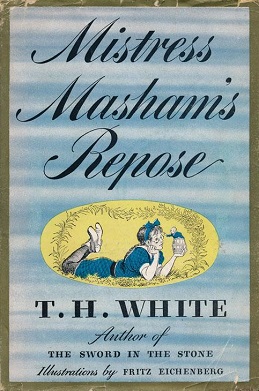
Mistress Masham's Repose (1946) is a novel by T. H. White that describes the adventures of a girl who discovers a group of Lilliputians, a race of tiny people from Jonathan Swift's satirical classic Gulliver's Travels. The story is set in Northamptonshire, England, after the Second World War, but there is a strong flavour of the 18th century, both the fictional land of Lilliput and the British Empire of Swift, Gibbon, and Pope. Imperialism, and the need for self-governance, is a major theme in the novel.

Le Voyage de Gulliver à Lilliput et chez les Géants, released in the United States as Gulliver's Travels Among the Lilliputians and the Giants and in the United Kingdom as Gulliver's Travels—In the land of the Lilliputians and the Giants, is a 1902 French silent trick film directed by Georges Méliès, based on Jonathan Swift's 1726 novel Gulliver's Travels.

Lagado is a fictional city from the 1726 satirical novel Gulliver's Travels by Jonathan Swift.
Gulliver's Travels is a book by Jonathan Swift.
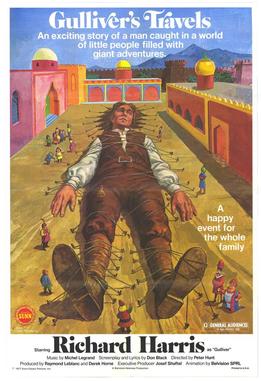
Gulliver's Travels is a 1977 British-Belgian film based on the 1726 novel of the same name by Jonathan Swift. It mixed live action and animation, and starred Richard Harris in the title role.

Gulliver's Travels is a 2010 American fantasy adventure comedy film directed by Rob Letterman in his live-action directorial debut, produced by John Davis and Gregory Goodman, written by Joe Stillman and Nicholas Stoller with music by Henry Jackman. It is loosely based on Part One of the 1726 novel of the same name by Jonathan Swift, though the film takes place in the modern day and contains references to modern pop culture. It stars Jack Black in the title role, Jason Segel, Emily Blunt, Amanda Peet, Billy Connolly, Chris O'Dowd, T.J. Miller, James Corden and Catherine Tate, and is exclusively distributed by 20th Century Fox.
Saban's Gulliver's Travels is a French animated series that aired from September 8, 1992, to June 29, 1993.
Gulliver Returns is a 2021 animated comedy film produced by 95 Animation Studio and Gulliver Films. Based on an original idea by Volodymyr Zelenskyy, Borys and Serhiy Shefir, and Andriy Yakovlev, it is directed by Ilya Maksimov, with a screenplay by Michael Ryan. The film is a loose adaptation of Gulliver's Travels by Jonathan Swift.
{{cite web}}: CS1 maint: multiple names: authors list (link)